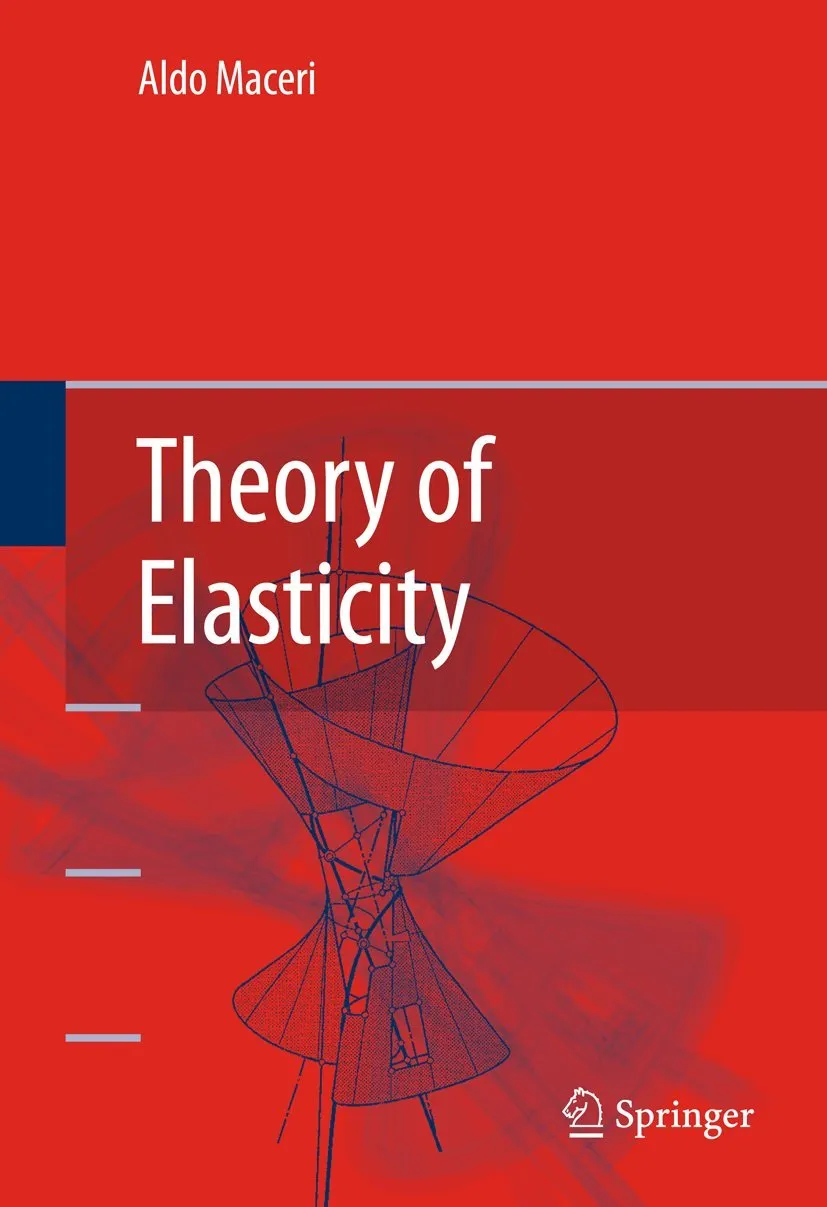Home
|
Products
|
9789356962026

Theory of Elasticity | Hardcover
by Maceri
Highlights

9783642113918
ISBN

Maceri
Author

716
Pages

1050 gm
Weight

English
Language

2010
Year

N/A
Edition

Hardcover
Binding
₹22734
₹25261
- TheTheoryofelasticitystudiesthebehaviorofthosebodiesthatrecovertheiri- tial state when the causes which produce deformations are removed. Its results constitutethefoundationsofthe Theory of structuresandthenareofmaximum importanceforengineers. The Theory of elasticity moves freely within an uni ed mathematical fra- workthatprovidestheanalyticaltoolsforcalculatingstressesanddeformationsin astrainedelasticbody. Alltheelasticproblemscanbeexactlyanalyzedemploying theclassicalMathematicalanalysis,withtheexceptionoftheunilateralproblems forwhichtheemploymentoftheFunctionalanalysisismandatory. TheTheoryofelasticitywasfoundedbythefamousmathematicianCauchyinthe eighteenth-century. Duringitshistoricaldevelopmentthisscienti csectorproposed tothemathematiciansvariousproblemsthathavecontributedorentirelygenerated thedevelopmentofcomplexmathematicaltheories,astheVariationalcalculusand theFiniteelementmethod. Thematteranalyzedinthisbookis -three-dimensional problems (Chap. 1), and particularly the problem of Saint Venant(Chap. 1), -two-dimensionalproblems,aspanels,plates,shells(Chap. 3), -one-dimensionalproblems,asropes,beams,arches(Chap. 4), -thermalstressproblems(Chap. 5), -stabilityproblems(Chap. 6), -anisotropicproblems,thatconstitutethebasictoolfortheanalysisofstructuresin compositematerial(Chap. 7), -nonlinearelasticproblems,as niteelasticityandunilateralproblems(Chap. 8). InthisbookIhaveconstantlykeptinmindthepracticalapplicationoftheth- reticalresults. SoIhavealwaystriedtogivetoengineers,inasimpleform,aclear indicationofthenecessaryfundamentalknowledgeoftheTheoryofelasticity. In thepastsometechniquesofcalculationweredevelopedforparticularelasticpr- lemsthatcannotbeorganizedinmathematicaltheoriesbutareextremelysimpleto apply. Suchtechnicaltheorieshavealwaysfurnishedresultsexperimentallyveri ed v vi Preface withgoodapproximationandthenamongthemIhavepresentedthosethatarestill usefultoolsofveri cationintheStructuraldesign. Throughouttheanalysisoftheelasticproblemsmyconstantfocushasbeento achievethemaximumclarityandbecauseofthisIhavesacri cedvariousbright discussions. Ihavedevelopedthetreatmentofthesubjectsinclassicalway,butto thelightofthemodernMathematicaltheoryoftheelasticityandwithmoreaccented relief to the connections with the Thermodynamics. Just for this, to give a clear justi cationofthefundamentalequationoftheThermoelasticityIhaveapplieda techniqueofanalysisproperoftheFluiddynamics. Howeverinthediscussionof theunilateralproblems,wheretheFunctionalanalysisiscompulsory,Ihaverelated indetailsthemathematicalaspectsofthetheoreticalanalysis. Roma,Italy AldoMaceri October2009 Contents 1 The Three-Dimensional Problem.
- .1 1. 1 AnalysisofStrain.
- .1 1. 1. 1 ComponentsofDisplacement.
- .1 1. 1. 2 In nitesimalDeformation.
- .2 1. 1. 3 ElongationandShearingStrain.
- .4 1. 1. 4 SmallDeformations.
- .5 1. 1. 5 ComponentsofStrain.
- .9 1. 1. 6 PrincipalDirectionofStrain.
- .14 1. 1. 7 InvariantsofStrain.
- .21 1. 1. 8 PlaneStateofStrain.
- .23 1. 1. 9 EquationsofCompatibility.
- .24 1. 1. 10MeasurementofStrain.
- .25 1. 2 AnalysisofStress.
- .27 1. 2. 1 StressVector.
- .27 1. 2. 2 NormalStress-ShearingStress.
- .29 1. 2. 3 ComponentsofStress.
- .30 1. 2. 4 Symmetryof? -DifferentialEquations ofEquilibrium-Cauchy'sBoundaryConditions.
- .31 1. 2. 5 SymmetryofStressVector.
- .38 1. 2. 6 RelationsBetweenNormalorShearingStress andComponentsofStress.
- .39 1. 2. 7 PrincipalDirectionofStress.
- .40 1. 2. 8 InvariantsofStress.
- .42 1. 2. 9 Mohr'one-dimensionalproblems,asropes,beams,arches(Chap. 4), -thermalstressproblems(Chap. 5), -stabilityproblems(Chap. 6), -anisotropicproblems,thatconstitutethebasictoolfortheanalysisofstructuresin compositematerial(Chap. 7), -nonlinearelasticproblems,as niteelasticityandunilateralproblems(Chap. 8). InthisbookIhaveconstantlykeptinmindthepracticalapplicationoftheth- reticalresults. SoIhavealwaystriedtogivetoengineers,inasimpleform,aclear indicationofthenecessaryfundamentalknowledgeoftheTheoryofelasticity. In thepastsometechniquesofcalculationweredevelopedforparticularelasticpr- lemsthatcannotbeorganizedinmathematicaltheoriesbutareextremelysimpleto apply. Suchtechnicaltheorieshavealwaysfurnishedresultsexperimentallyveri ed v vi Preface withgoodapproximationandthenamongthemIhavepresentedthosethatarestill usefultoolsofveri cationintheStructuraldesign. Throughouttheanalysisoftheelasticproblemsmyconstantfocushasbeento achievethemaximumclarityandbecauseofthisIhavesacri cedvariousbright discussions. Ihavedevelopedthetreatmentofthesubjectsinclassicalway,butto thelightofthemodernMathematicaltheoryoftheelasticityandwithmoreaccented relief to the connections with the Thermodynamics. Just for this, to give a clear justi cationofthefundamentalequationoftheThermoelasticityIhaveapplieda techniqueofanalysisproperoftheFluiddynamics. Howeverinthediscussionof theunilateralproblems,wheretheFunctionalanalysisiscompulsory,Ihaverelated indetailsthemathematicalaspectsofthetheoreticalanalysis. Roma,Italy AldoMaceri October2009 Contents 1 The Three-Dimensional Problem.
- .1 1. 1 AnalysisofStrain.
- .1 1. 1. 1 ComponentsofDisplacement.
- .1 1. 1. 2 In nitesimalDeformation.
- .2 1. 1. 3 ElongationandShearingStrain.
- .4 1. 1. 4 SmallDeformations.
- .5 1. 1. 5 ComponentsofStrain.
- .9 1. 1. 6 PrincipalDirectionofStrain.
- .14 1. 1. 7 InvariantsofStrain.
- .21 1. 1. 8 PlaneStateofStrain.
- .23 1. 1. 9 EquationsofCompatibility.
- .24 1. 1. 10MeasurementofStrain.
- .25 1. 2 AnalysisofStress.
- .27 1. 2. 1 StressVector.
- .27 1. 2. 2 NormalStress-ShearingStress.
- .29 1. 2. 3 ComponentsofStress.
- .30 1. 2. 4 Symmetryof? -DifferentialEquations ofEquilibrium-Cauchy'sBoundaryConditions.
- .31 1. 2. 5 SymmetryofStressVector.
- .38 1. 2. 6 RelationsBetweenNormalorShearingStress andComponentsofStress.
- .39 1. 2. 7 PrincipalDirectionofStress.
- .40 1. 2. 8 InvariantsofStress.
- .42 1. 2. 9 Mohr'TheTheoryofelasticitystudiesthebehaviorofthosebodiesthatrecovertheiri- tial state when the causes which produce deformations are removed. Its results constitutethefoundationsofthe Theory of structuresandthenareofmaximum importanceforengineers. The Theory of elasticity moves freely within an uni ed mathematical fra- workthatprovidestheanalyticaltoolsforcalculatingstressesanddeformationsin astrainedelasticbody. Alltheelasticproblemscanbeexactlyanalyzedemploying theclassicalMathematicalanalysis,withtheexceptionoftheunilateralproblems forwhichtheemploymentoftheFunctionalanalysisismandatory. TheTheoryofelasticitywasfoundedbythefamousmathematicianCauchyinthe eighteenth-century. Duringitshistoricaldevelopmentthisscienti csectorproposed tothemathematiciansvariousproblemsthathavecontributedorentirelygenerated thedevelopmentofcomplexmathematicaltheories,astheVariationalcalculusand theFiniteelementmethod. Thematteranalyzedinthisbookis -three-dimensional problems (Chap. 1), and particularly the problem of Saint Venant(Chap. 1), -two-dimensionalproblems,aspanels,plates,shells(Chap. 3), -one-dimensionalproblems,asropes,beams,arches(Chap. 4), -thermalstressproblems(Chap. 5), -stabilityproblems(Chap. 6), -anisotropicproblems,thatconstitutethebasictoolfortheanalysisofstructuresin compositematerial(Chap. 7), -nonlinearelasticproblems,as niteelasticityandunilateralproblems(Chap. 8). InthisbookIhaveconstantlykeptinmindthepracticalapplicationoftheth- reticalresults. SoIhavealwaystriedtogivetoengineers,inasimpleform,aclear indicationofthenecessaryfundamentalknowledgeoftheTheoryofelasticity. In thepastsometechniquesofcalculationweredevelopedforparticularelasticpr- lemsthatcannotbeorganizedinmathematicaltheoriesbutareextremelysimpleto apply. Suchtechnicaltheorieshavealwaysfurnishedresultsexperimentallyveri ed v vi Preface withgoodapproximationandthenamongthemIhavepresentedthosethatarestill usefultoolsofveri cationintheStructuraldesign. Throughouttheanalysisoftheelasticproblemsmyconstantfocushasbeento achievethemaximumclarityandbecauseofthisIhavesacri cedvariousbright discussions. Ihavedevelopedthetreatmentofthesubjectsinclassicalway,butto thelightofthemodernMathematicaltheoryoftheelasticityandwithmoreaccented relief to the connections with the Thermodynamics. Just for this, to give a clear justi cationofthefundamentalequationoftheThermoelasticityIhaveapplieda techniqueofanalysisproperoftheFluiddynamics. Howeverinthediscussionof theunilateralproblems,wheretheFunctionalanalysisiscompulsory,Ihaverelated indetailsthemathematicalaspectsofthetheoreticalanalysis. Roma,Italy AldoMaceri October2009 Contents 1 The Three-Dimensional Problem.
- .1 1. 1 AnalysisofStrain.
- .1 1. 1. 1 ComponentsofDisplacement.
- .1 1. 1. 2 In nitesimalDeformation.
- .2 1. 1. 3 ElongationandShearingStrain.
- .4 1. 1. 4 SmallDeformations.
- .5 1. 1. 5 ComponentsofStrain.
- .9 1. 1. 6 PrincipalDirectionofStrain.
- .14 1. 1. 7 InvariantsofStrain.
- .21 1. 1. 8 PlaneStateofStrain.
- .23 1. 1. 9 EquationsofCompatibility.
- .24 1. 1. 10MeasurementofStrain.
- .25 1. 2 AnalysisofStress.
- .27 1. 2. 1 StressVector.
- .27 1. 2. 2 NormalStress-ShearingStress.
- .29 1. 2. 3 ComponentsofStress.
- .30 1. 2. 4 Symmetryof? -DifferentialEquations ofEquilibrium-Cauchy'sBoundaryConditions.
- .31 1. 2. 5 SymmetryofStressVector.
- .38 1. 2. 6 RelationsBetweenNormalorShearingStress andComponentsofStress.
- .39 1. 2. 7 PrincipalDirectionofStress.
- .40 1. 2. 8 InvariantsofStress.
- .42 1. 2. 9 Mohr'sCircle.
- .43 1. 2. 10Mohr'sPrincipalCircles.
- .57 1. 2. 11 DeterminationoftheMaximumNormalStress orShearingStressbytheMohr'sPrincipalCircles.
- .61 1. 2. 12PlaneStateofStress.
- .63 1. 2. 13UniaxialStateofStress.
- .65 1. 2. 14MeasurementofStress.
- .66 1. 3 PrincipleofVirtualWorks.
- .66 1. 3. 1 PrincipleofVirtualWorks.
- . Read more.
Online store of medical books
Discover a comprehensive range of medical books at our online store. From anatomy and physiology to the latest clinical guidelines, we've got you covered.
Trusted by students, educators, and healthcare professionals worldwide. Browse top publishers and expert-authored titles in every medical specialty. Enjoy fast shipping, secure payments, and easy returns. Your one-stop destination for quality medical knowledge at your fingertips.
Whether you're preparing for exams or expanding your clinical expertise, our curated collection ensures you have the right resources at hand. Dive into detailed illustrations, case studies, and up-to-date research that enhance your understanding and practical skills.
We regularly update our inventory to include the latest editions and newly released titles, helping you stay current in the ever-evolving medical field. Our advanced search and filtering tools make finding the perfect book quick and hassle-free.
Join our community of lifelong learners and medical enthusiasts. Sign up for exclusive discounts, early access to new arrivals, and personalized book recommendations tailored to your professional interests.
